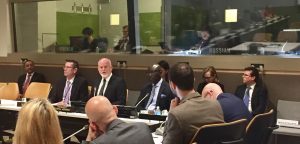As delivered
Opening Remarks by Peter Thomson, the President of the General Assembly, at 2017 Report of the Secretary-General on the Responsibility to Protect: “Accountability for national atrocity prevention and international assistance: building upon existing good practices”
28 April, 2017
 Mr. Adama Dieng, Special Adviser to the Secretary-General on the Prevention of Genocide
Mr. Adama Dieng, Special Adviser to the Secretary-General on the Prevention of Genocide
Mr. Ivan Šimonović, Special Adviser to the Secretary-General on the Responsibility to Protect,
Excellencies,
Distinguished guests
Ladies and Gentlemen
It is a pleasure to join you this morning for this panel discussion on accountability for atrocity prevention.
The initiative by the UN Office on Genocide Prevention and Responsibility to Protect to hold this thematic discussion with Member States as part of the preparatory process for the Secretary-General’s Responsibility to Protect report, is a welcome one.
Across our world, there has long been widespread global agreement that innocent civilians must be protected from atrocity crimes.
This view was cemented in 2005, when World leaders declared in the World Summit outcome document that “each individual State has the responsibility to protect its populations from genocide, war crimes, ethnic cleansing, and crimes against humanity” and that the international community should help States to exercise this responsibility.
Despite this support coming from the highest levels of Government – the responsibility to protect doctrine has failed to be adequately upheld.
At the same time, we have seen in many parts of the world a rise in precursors and risk factors that can lead to the commission of atrocity crimes.
This includes conflict and instability; serious human rights violations; weak State structures; impunity for violations; patterns of discrimination; rhetorical and violent attacks directed against specific groups; and political, economic, and other motivators for allowing these conditions to take hold.
In this context, efforts to bring Member States together to find common ground to progress implementation of the responsibility to protect principle are both critical and timely.
Excellencies,
The theme of this year’s report on ‘accountability for prevention’ is particularly prescient.
The responsibility to protect calls on States to take appropriate and necessary measures to prevent atrocity crimes.
It asks States who do not have adequate capacity, to seek international support.
And it provides that the international community must stand ready to help States protect their populations from atrocity crimes, when such requests have been received.
While these obligations are clear, accountability for failures to act have long been absent.
This includes failures by Governments to build transparent and accountable State structures, based on good governance, human rights, and rule of law, and which can serve to impede the commission of atrocity crimes.
It includes State actors ignoring warning signs, failing to repudiate acts of incitement, and not responding to rising social tensions and violence.
And it includes failures by the international community to respond in a timely and effective way to countries in fragile situations who have requested help to fill protection gaps, and respond to situations of risk.
Strengthening accountability in this context is therefore critical – not only to improving international justice and the rule of law – but as a key driver of prevention action.
Prevention action fundamentally requires efforts to build long-term sustainable peace and achieve sustainable development, all of which can help to build resilience and address root causes.
In this context, we must therefore prioritise effective implementation of the 2030 Agenda for Sustainable Development, and the UN’s Sustaining Peace resolutions, as part of comprehensive efforts to prevent atrocity crimes, and accelerate implementation of the responsibility to protect.
This was the thrust of my 24 January High-Level Meeting on Building Sustainable Peace where member states underlined that without sustainable peace there will be no sustainable development – and without sustainable development there will be no sustainable peace.
Excellencies, Ladies and Gentlemen,
Protecting innocent civilians from genocide, war crimes, ethnic cleansing, and crimes against humanity, is one of our most fundamental obligations – both as individuals, and collectively.
I therefore look forward to a rich discussion today on how we can work together to fulfil our commitment to protecting civilians from these grave international crimes.
I thank you.

